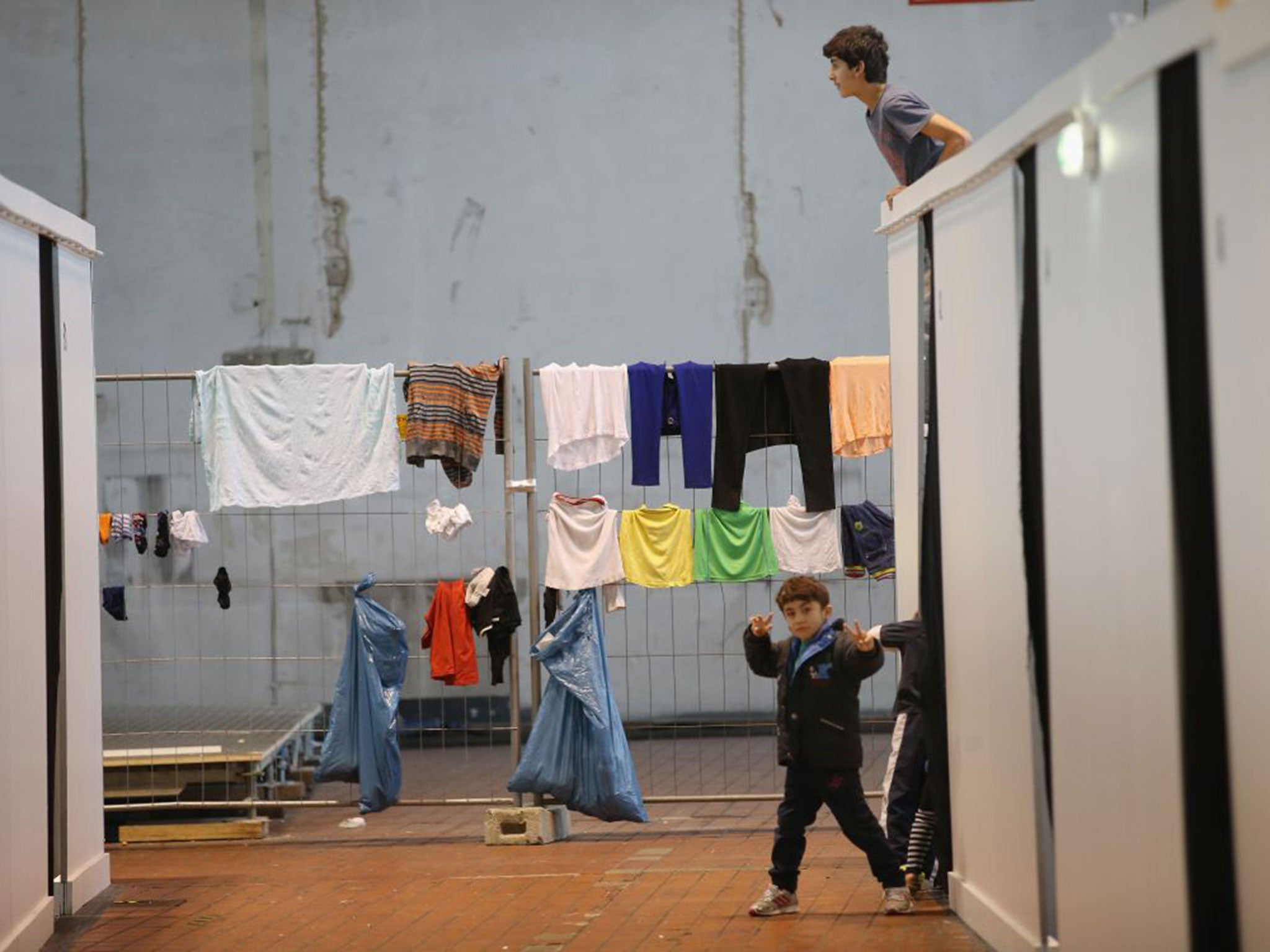Refugee crisis: Thousands are living in cramped conditions in a former German airport waiting to be granted asylum
Boredom, the lack of space and inactivity lead to frequent outbreaks of violence, yet authorities plan to accommodate a further 5,000 people at Tempelhof airport in Berlin

Berlin’s gigantic Tempelhof airport, a Nazi architectural icon, is best known today for being the German capital’s biggest refugee camp. Since late last year up to 2,300 asylum seekers have been camped inside its vast aircraft hangers, sleeping 12 to a cubicle on wooden bunk beds and queuing up to use portable toilets.
Abdul al-Wahab, 26, and his Adman, 19, fled their home in Aleppo last year and have been living in Tempelhof for the past three months. Walking out into the chill wind and drizzle of Berlin this week, they seemed exasperated. “Of course we are grateful to Germany for taking us in, but the conditions here are boring and bad,” Abdul told The Independent. “We can hardly eat the food, the guards are always serious and bad tempered, and you have to wait and wait to wash or go to the toilet. But the worst is that we don’t know how much longer we will have to stay here.”
“We would just like to find a job and live in a room on a normal street,” Adman added as he stood clutching a plastic bag full of empty bottles that he planned to swap for cash. The brothers’ predicament is shared by tens of thousands of the 1.1 million migrants who entered Germany last year, mainly as a result of Chancellor Angela Merkel’s “open door” refugee policy. Most have to wait for months, often living in cramped accommodation, while their applications for asylum are processed. The lucky ones find homes in flats or hotels that have been taken over by local authorities.
Volunteers offer German language courses, but refugees are banned from taking part in state-funded integration courses until they have been formally granted the right to asylum. Boredom, cramped conditions and inactivity lead to frequent outbreaks of violence in refugee camps. These are often sparked by trivial arguments about food or who is first in line for the toilet.
Macedonia’s decision to seal off the Balkan migrant route to western Europe has led to a sudden imbalance in the distribution of refugees across Germany. While big cities such as Berlin and Düsseldorf are still struggling to cope with the numbers, asylum accommodation in rural areas and the east of the country is half empty. The German government is hoping that the European Union’s refugee deal with Turkey, reached in Brussels last Friday, will slow the influx further.
Refugees settle in Germany
Show all 12But local authorities remain braced for numbers to keep rising. Berlin has plans to accommodate a further 5,000 migrants at Tempelhof. Some, though, have already had enough and are going back, said Sascha Langenbach, a refugee welfare spokesman for Berlin’s city government. “About 150 Iraqis are leaving Berlin for home each month,” he said, “but this is in no relation to the numbers arriving and still here.”
Government statistics show that 37,000 of the 1.1 million migrants who arrived last year have voluntarily returned, the majority having received financial incentives to do so. About 21,000 were forcibly repatriated. The exodus has been hastened by a government decision to declare as “safe” countries previously considered to have persecuted opponents. Ms Merkel’s government is particularly proud of its success in persuading Iraqi migrants to return home and argues that this is due to its policy of arming Kurdish militants to fight Isis in Iraq.
Despite its military engagement in Afghanistan, Germany is also encouraging Afghan refugees to go back. Together with migrants from Iran, Nigeria, Pakistan and Somalia, Afghans who return voluntarily also receive up to €2,700 (£2,130) each, plus cash for business investment. Mohammad Asif Noori, an Afghan in his early thirties, was flown back to Kabul in February after spending two months in a German refugee camp. “The Europeans think refugees are destroying Europe,” he told the AFP news agency.
Germany remains overwhelmed by the refugee crisis and is struggling to cope with a backlog of 770,000 asylum requests; these will take months, if not years, to clear. Thousands of asylum seekers are without passports. Many have thrown them away hoping to pass themselves off as war refugees.
Although most towns, cities and villages continue to welcome refugees, violence against migrants is on the increase. Ms Merkel is banking on her claim that the EU refugee deal with Turkey will prove effective. She also hopes that a potential new wave of migrants into Europe via Italy will fail to materialise.
But Germany’s population of rejected asylum seekers is likely to increase all the same. The government is aware that deporting hundreds of thousands of them is hardly an option. Cash incentives are one strategy which appears to work. As Christian Klos, a German Interior Ministry spokesman, admits: “They are being counselled to leave voluntarily.”
Subscribe to Independent Premium to bookmark this article
Want to bookmark your favourite articles and stories to read or reference later? Start your Independent Premium subscription today.

Join our commenting forum
Join thought-provoking conversations, follow other Independent readers and see their replies